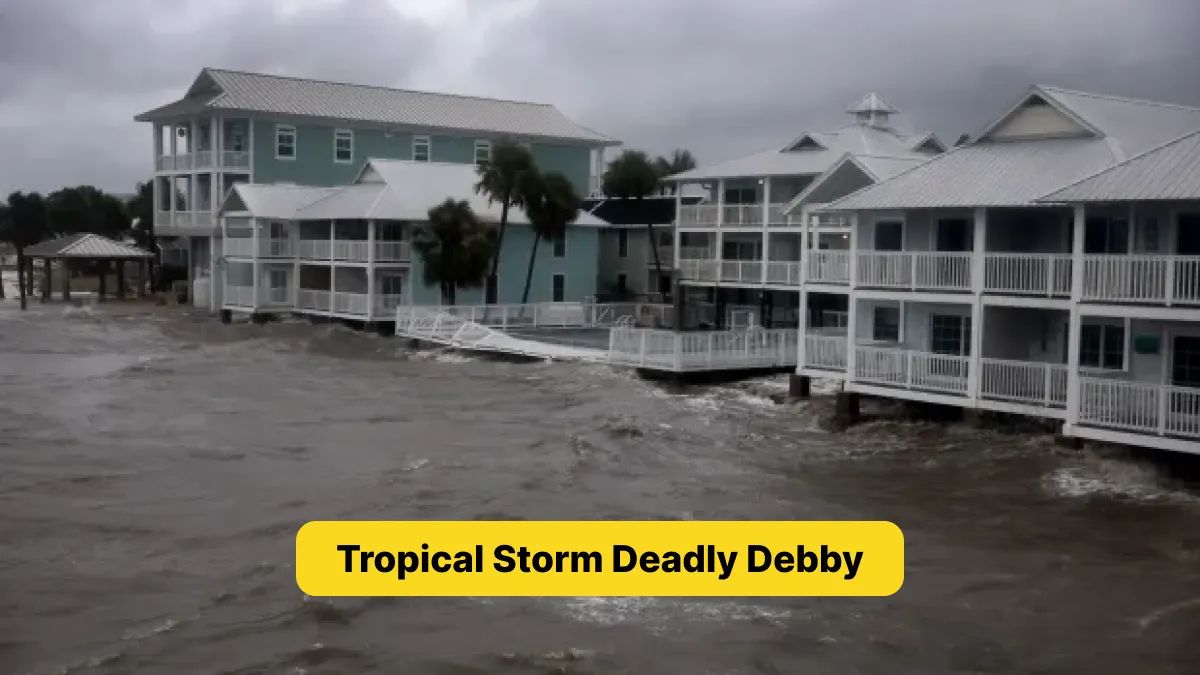Tropical Storm Deadly Debby is causing problems along the East Coast. This morning, the storm made landfall with heavy rain, powerful winds, and flooding in various areas. People have been warned to protect their lives by adhering to official advice.
Heavy Rainfall and Flooding
Debby made landfall initially in areas near Charleston, South Carolina. Since then, it has traveled north up the East Coast, impacting cities like Savannah, Georgia, and Myrtle Beach, South Carolina. She has dumped a tremendous amount of rain in these areas. In some places, rainfall totals have already reached 10 inches or more.
As a result, the region has experienced massive flooding. The water level has risen to the streets and highways, causing traveling to become very difficult and dangerous. Local leaders are trying to ensure that the roadways are clear and stranded people are assisted. Residents of this area witnessed their homes flood and property destroyed.
Strong Winds Cause Damage
In addition to pouring heavy rain, Debby has also brought strong winds. The wind was estimated at a speed of 60 miles per hour. The gusts knocked down trees, power lines, and utility poles. Thousands of people have been left without electricity.
Power companies are working hard to restore service as quickly as possible. Repairs, however, could take days – especially if this storm keeps moving at a slow pace. For now, people are being told to use flashlights – avoiding the use of candles, which are always a fire hazard.
Evacuations and Warnings
Evacuation orders have been in place across several areas due to the effects of the storm. Specifically, coastal and low-lying areas are most susceptible. Authorities are asking the public to evacuate if they are in these prone areas.
In addition to the evacuations, there are high wind and dangerous flooding warnings. The National Weather Service has issued these warnings for information and safety in view of Hurricane Ian’s approaching landfall. People need to keep an eye on local news stations with regard to the approach of Hurricane Ian and heed advice that may be given by emergency services.
Impact on Daily Life
The effects of Tropical Storm Debby are being felt in many ways. Schools in those areas were closed for the day. Many businesses also shut down as a precaution. People were asked to stay home if possible and avoid any unnecessary travel.
Emergency shelter settings have been arranged, and those in need may avail themselves of these facilities for their safety. Food, water, and medical care are available for those at shelters. If you are going to a shelter, remember to take vital documents and personal things along.
Long-Term Outlook
The tropical storm is expected to weaken as it continues to move up the East Coast, but it’s likely to bring rain and wind to areas further north. A good deal of attention from meteorologists is being paid to the path being taken by Tropical Storm Debby. They will update the public as necessary and advise on any change in strength or direction.
Recovery efforts will begin right after the storm has passed. This will involve the clearing of debris, repairing damaged infrastructure, and helping affected communities get back on their feet. Local and state officials are already planning these recovery efforts and will coordinate with federal agencies as needed.
How to Stay Safe
Though Debby is still affecting the East Coast, here are some safety tips to help keep you and your family safe:
- Stay Informed: Monitor the latest weather updates from credible sources, such as local news stations, NOAA Weather Radio, or any warnings or advisories issued by local authorities.
- Keep Away from the Flooded Areas: Avoid driving or walking in the streets that are always flooded. It is difficult to assess the depth of water and may hide dangerous hazards.
- Be Prepared for the Loss of Power: Have an emergency kit with food, water, and flashlight batteries ready. If you lose your power, then use flashlights; do not use candles.
- Follow Evacuation Orders: If you are in an evacuation zone, leave as soon as possible. Follow the instructions given by emergency services to ensure your safety.
- Check on Neighbors: If it is safe, check on neighbors, especially those who are elderly or have special needs. They may need extra help during this time.
Such precautions will help to guarantee your safety and that of those around you. Keep alert and be guided by local authorities on how to overcome this difficult moment.
